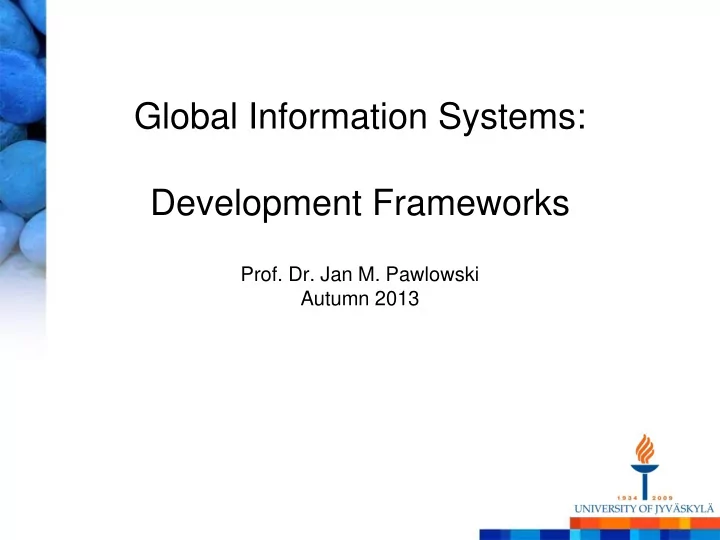

Global Information Systems: Development Frameworks Prof. Dr. Jan M. Pawlowski Autumn 2013
Assumptions Scenario: Global Software Development – Multiple developers in different locations – Developing software for various markets – Distributed development, distributed distribution Process Framework – Detailed discussion of process parts Assumption: Usage of development models
Potential views Internationalization (Management, strategy) Outsourcing / offshoring (Management, strategy) System development methods / process view (Information Systems) Network view (multiple perspectives) Specific views – Culture – Coordination – …
Process Framework (Sangwan et al., 2006) Market Intent / Product Vision Requirements Business Project Planning Engineering Goals Requirements Project Plan Specification Legacy Architecture & Product Product Architecture Design Systems Module Development Specification
Decision points (Sangwan et al.,2006) 1. Initiate research – Developing new products / services 2. Initiate requirements definition and architecture design 3. Developing a product / service – Scope – Schedule – Investments 4. Releasing a product / service 5. Removing a product / service
Process Framework: The Open Unified Process Basis to structure the development of global information systems Framework for software engineering Adaptable framework – E.g., agile unified process, configured methods, plugins Goals (Eclipse, 2007) – Collaborate to align interests and share understanding – Balance competing priorities to maximize stakeholder value – Focus on the architecture early to minimize risks and organize development. – Evolve to continuously obtain feedback and improve http://www.eclipse.org/epf
The Open Unified Process – Project Lifecycle Inception. Do we agree on project scope and objectives, and whether or not the project should proceed? Elaboration. Do we agree on the executable architecture to be used for developing the application and do we find that the value delivered so far and the remaining risk is acceptable? Construction. Do we find that we have an application that is sufficiently close to being released that we should switch the primary focus of the team to tuning, polishing and ensuring successful deployment? Transition. Is the application ready to release? [Source: http://www.epfwiki.net/wikis/openup/]
Open Unified Process – Project Lifecycle [Source: http://www.epfwiki.net/wikis/openup/]
The Open Unified Process – Disciplines Architecture Configuration and Change Management Development Project Management Requirements Test [Source: http://www.epfwiki.net/wikis/openup/]
The Open Unified Process – Disciplines Structured as tasks Project Management – Iteration Plan Leading to work products – Project Plan – Work Items List Architecture – Architecture Notebook – Risk List Configuration and Change Requirements Management – Supporting Development Requirements Specification – Design – Vision – Build – Use Case – Developer Test – Glossary – Implementation – Use-Case Model Test – Test Case – Test Log [Source: http://www.epfwiki.net/wikis/openup/] – Test Script
The Open Unified Process – Roles [Source: http://www.epfwiki.net/wikis/openup/]
Eclipse Process Framework Composer
Extensions: Enterprise Unified Process [Source: http://www.enterpriseunifiedprocess.com/]
Summary Unified Process as a basis for software development process Focus on different aspects of the lifecycle – E.g., risk management, communication Extension model for globally distributed processes and stakeholders
References Carmel, E., Abbott, P. (2006): Configurations of Global Software Development: Offshore versus Nearshore, ICSE 2006. Boland, D., Fitzgerald, B. (2004): Transitioning from a Co- Located to a Globally-Distributed Software Development Team : A Case Study at Analog Devices Inc., In: GSD Workshop, 2004 Johanson, J., & Vahlne, J.-E. 1977. The internationalization process of the firm: A model of knowledge development and increasing foreign market commitments. Journal of International Business Studies, 8(1): 23 – 32. Johanson, J., Vahlne, J.E. (2009): The Uppsala internationalization process model revisited: From liability of foreignness to liability of outsidership, Journal of International Business Studies, 40, 1411 – 1431
Contact Information ITRI Prof. Dr. Jan M. Pawlowski jan.pawlowski@titu.jyu.fi Skype: jan_m_pawlowski Office: Telephone +358 14 260 2596 Fax +358 14 260 2544 http://users.jyu.fi/~japawlow
Recommend
More recommend